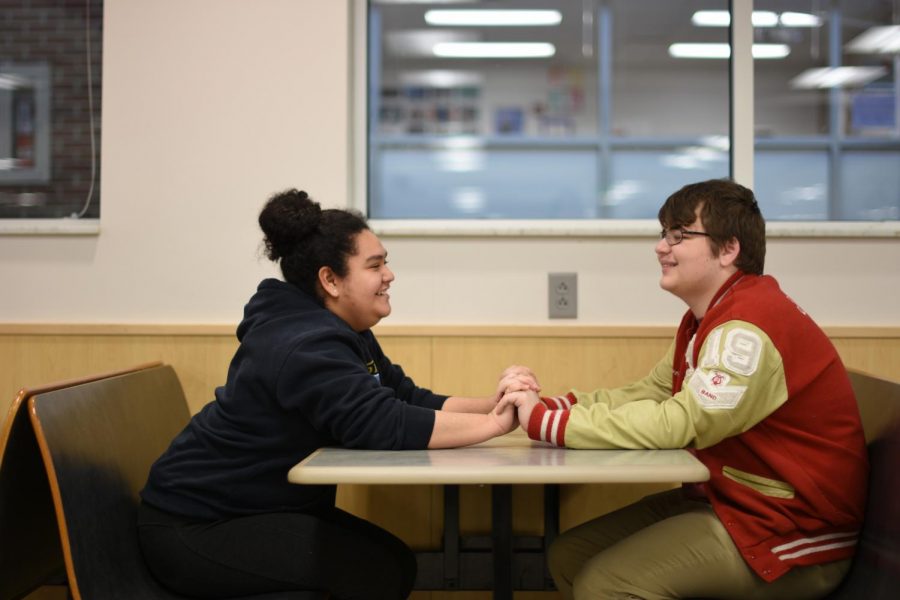Defying all odds
Sophomore Lesley Rodriguez and junior Ben Cantrell have been dating for about 11 months. With Rodriguez’s family speaking Spanish, Cantrell has been able to learn another language and adapt to her family’s culture.
February 23, 2018
When Senior Ellen Stuckowitz first entered into a relationship with her current boyfriend, Kelvin Wong, she was a little nervous about telling her parents. Telling them was nerve-racking, but she decided to do it the day before her mom’s birthday. Her parents were both a bit shocked at first, but soon came to accept the fact that her first boyfriend lives thousands of miles away in Ireland.
“My parents were a bit shocked at first so it took them some time to actually get used to it,” Stuckowitz said. “But now they really like him and they just have really accepted the fact that we’re together.”
Today, student relationships are impacted by many different factors, including distance, social media, and restrictions put in place by parents or religion.
Distance
Stuckowitz and boyfriend Wong have a long distance relationship. Wong lives in Castleblayney, co Monaghan, Ireland, a city over 3,600 miles away from Indianapolis. The two met through a mutual friend while Stuckowitz was living in Ireland as an exchange student. After she moved back, they managed to find a way to see each other by alternating who visits who every three or four months. Stuckowitz says the distance has been a challenge, but has made the time they do get to spend together all the sweeter and has helped strengthen their relationship.
“It does bring more of the aspect of having to really communicate with each other and having to tell each other exactly what’s going on and not hide anything,” Stuckowitz said. “You just have to be completely open or else you’re communicating even less than you already are.”
Stuckowitz is not alone in dealing with space between her and her boyfriend, as for some students at SHS, distance has also played a major role in their relationships. Junior Cassie Napier and Logan Phares have been together for a total of three years, however, two years into their relationship, Phares moved to Fort Branch, Indiana.
Napier and Phares met at their church when they were 13. According to Napier, he was shy at first, but their relationship blossomed after she introduced herself, saying he eventually grew more open and they became close. For the first two years of their relationship, they were able to hang out and see each other everyday, however, after he moved, spending time together became more difficult.
As their schedules became busier, the couple found it to be more of a challenge to find time for each other. They were only able to see each other once or twice a month. Napier struggled to adjust to the “drastic” change, which is why she doesn’t think a long distance type of relationship is for everyone. It requires, she says, a specific type of mentality.
“I think you definitely have to have the patience and the trust in somebody, to be separated from them and still be able to be with them,” Napier said.
Restrictions
Certain restrictions can play a part in student relationships, whether they’re boundaries set by parents, laws or religion.
Junior Marissa Cooper, part of the Apostolic Pentecostal church, says that within her church, couples “court” each other and have to get approval from their pastor before entering into a relationship. For other SHS students, their churches teach similar principles. Junior Alyssa Hightower attends the Mormon Church, where teenagers are recommended to not start dating until they turn 16. For Hightower, this is a reasonable request, helping her to make the personal decision to not pursue a serious relationship in high school.
Growing up, Hightower did not feel the need to pursue relationships and saw the whole idea as “silly.” She says her religious beliefs helped her to not become preoccupied with the idea and have helped her focus more on both schoolwork and loved ones. Despite having a different opinion about dating than her peers, Hightower says she hasn’t felt judged for her beliefs and chooses not to judge others for theirs.
“I know they’ve grown up a different way and I was raised by my parents in a specific way, and I respect that,” Hightower said.
Since turning 16, Hightower has had to make more decisions regarding the dating trend, such as trying to decide what to do when asked out on a date. Asking for her parents’ advice is one of the ways Hightower tries to stay true to herself and her religion, saying that she takes their advice into consideration because she really respects her parents and that seeking their advice helps her feel more confident in her decisions. According to Hightower, she does not have to date a fellow Mormon if she so chooses, but similar personal beliefs is something she chooses to look for because her faith has helped her stay strong since coming of age.
“It is something I worry about a little more (since turning 16),” Hightower said, “but within my faith, since I’m strong in it, I don’t waver from that standard. So, I just kind of stay along those lines and it makes me confident. It’s just nice (that) I can control my relationship status.”
With the wide range of cultures at SHS, sometimes couples have to overcome a cultural or language barrier when interacting with family and friends. Sophomore Lesley Rodriguez and junior Ben Cantrell have gone through a similar situation, with Rodriguez’s mother and grandmother speaking Spanish.
Cantrell is not a native speaker, but has tried to pick up on the language and culture in order to connect more with his girlfriend and her family.
“We make the differences work,” Rodriguez said. “I feel like he just learns more about another culture and it’s nice. He understands where I’m from.”
Social media
When they first started dating, junior Alyssa Nelson and her boyfriend senior Manny Torres both had various types of social media: Instagram, Facebook, Twitter, Snapchat. But once their use started to interfere with their relationship, the couple both decided to get rid of Twitter and Snapchat due to the fact that it affected the trust in their relationship.
Similarly to Nelson and Torres, social and entertainment media can play a big part in teen relationships, both negatively and positively, and influence many at SHS.
With the growing number of different types of social media and entertainment, including TV, movies, and music, the influences on teen relationships have changed. According to Nelson, it’s not always for the better. She thinks that the widespread use of social media has had a negative effect on relationships, including both dating and friendships.
“(Social Media) just offered a lot of drama and stuff (that) I didn’t really want to have to deal with when I was (in) my relationship,” Nelson said. “I wanted to focus on my relationship instead of distractions.”
After she and her boyfriend got rid of various forms of social media such as Twitter and Instagram, Nelson says that she was better able to focus on her and Torres’ relationship. She says it created a healthier environment and gave them more room to focus on each other and escape the “drama and whatnot” that Nelson says affected their relationship.
“(Getting rid of social media) provides a healthier type of relationship,” Nelson said. “It eliminates the worry in the back of your head.”
Giving up social media not only improved Nelson’s relationship, but it also helped her to focus more on her schoolwork, job, friends and family. She said getting rid of Instagram and Twitter helped her realize “who would be there for (her) no matter what” and that it increased her reliance on personal contact helping her to grow closer to her friends.
Another aspect of social media that can influence student relationships is the idea of “#goals” and posting about significant others on social media. For Nelson, this wasn’t as much of a problem in her relationship, explaining that “if he does it, he does it. If he doesn’t, he doesn’t” and that she didn’t need social media to put her relationship out there. Junior Alyssa Hightower agrees, saying she thinks it is a “cute little thing,” but that the definition of “relationship goals” can spread across a wide range, with her personal definition of “#goals” being different from somebody else’s.
Hightower and Nelson also mention how social media can impact students’ body image and how they view themselves. Nelson says she sees insecurity as a “big problem nowadays,” and that a lot of that stems from the “Instagram models” seen across social media. Hightower has a similar opinion in that she thinks that people, couples especially, can start to feel “tied down” and start comparing themselves to other couples they see across social media.
“Even if you’re not in a relationship, (sometimes) social media (can) kind of rule your life,” Hightower said. “But especially in a relationship, it can kind of determine your social status and what kind of person you are with that other person.”



